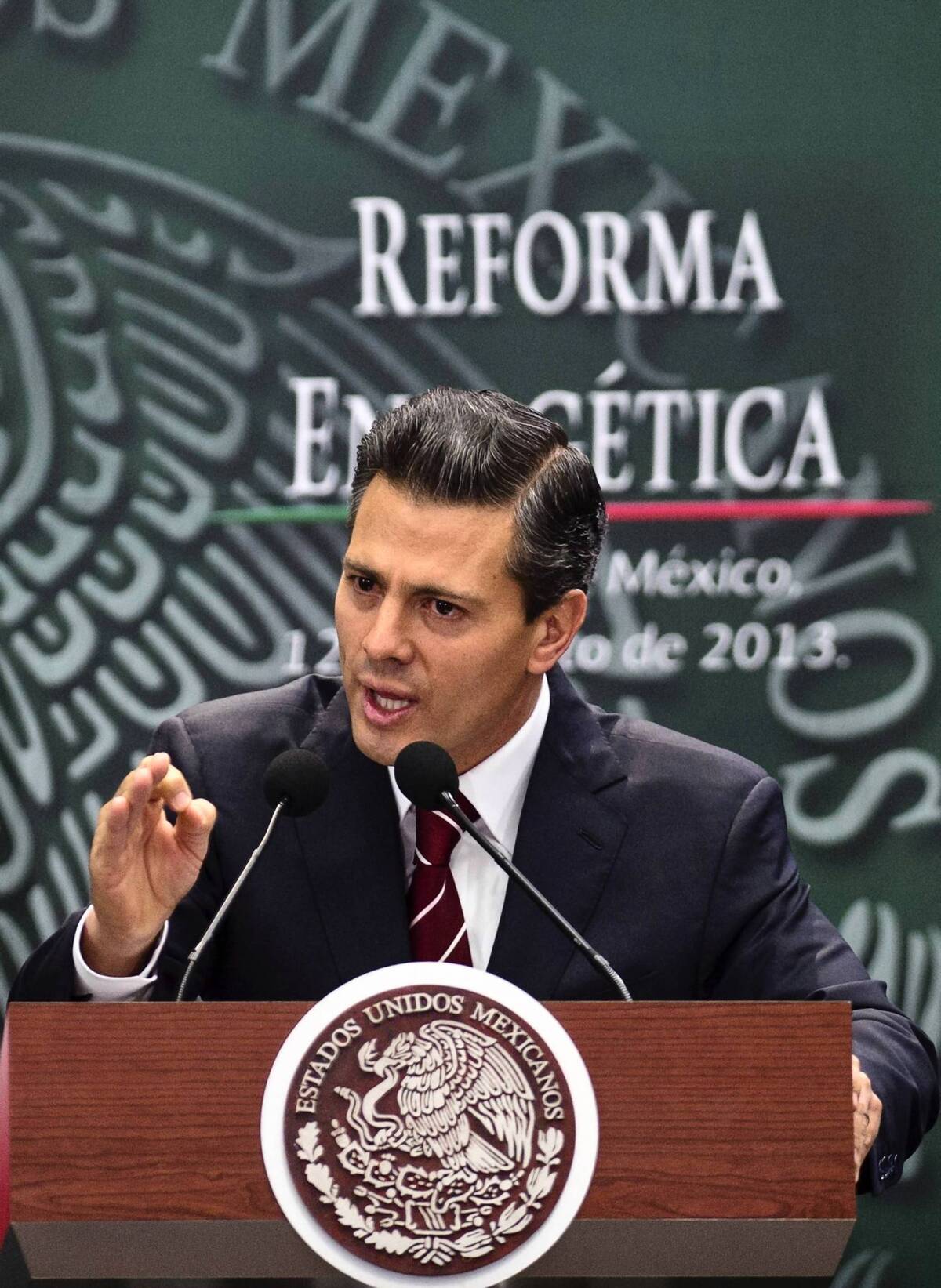Mexico’s officials wage PR battle to sell energy reform plan

MEXICO CITY — The little boy with the twinkling eyes smiles out from full-page newspaper ads. His hands are held out for us to see, covered in black oil, an offshore platform floating in the sea behind him.
“Oil is and always will be ours,” the ad proclaims in large capital letters.
The Mexican government may not be selling its gigantic state oil company, but officials are going full steam in selling what they plan to do with it.
On Tuesday, the day after President Enrique Peña Nieto unveiled a broad package of energy-sector reforms, the government flooded the airwaves, newspapers and other media with slick messages defending the proposal. Government officials made the rounds of television and radio talk shows.
Opponents followed suit, posting their arguments on YouTube or Twitter and planning street demonstrations. A group of well-known artists released a video with passionate pleas to scuttle the reforms.
The PR battle is on.
Peña Nieto’s proposed reform would change the Mexican Constitution, opening up the oil and gas industry to private companies, including foreign ones, for the first time in decades. That is treason to some Mexicans, who say oil and gas are part of the national patrimony that must not be ceded to outsiders — and that private investment in public services often ends up enriching a lucky few.
Peña Nieto is campaigning mightily, starting with a lavish ceremony Monday at the official presidential residence Los Pinos announcing the reform. He delivered a prime-time address to the nation Monday night that was carried on all television and radio networks. There were more speeches Tuesday.
He says the changes were necessary to make Petroleos Mexicanos, or Pemex, more efficient and to boost the economy. His main message to his domestic audience is not about the technical details of profit-sharing contracts and fiscal arrangements, which are in short supply anyway.
Instead, he emphasizes what he calls the tangible benefits for Mexican families. Gas and electricity bills will go down, he says. Half a million jobs will be created. Even food will become cheaper because of better fertilizers.
In the televised national address, Peña Nieto spoke from a softly lighted palatial stateroom, under crystal chandeliers and historical oil paintings. As he did earlier in the day, he invoked the name of Gen. Lazaro Cardenas, the revered president who nationalized the oil industry and kicked out foreign firms 75 years ago.
“Petroleum and other hydrocarbons will continue to belong to the Mexicans,” Peña Nieto said. “Pemex will remain a company that is 100% property of the nation.”
Energy Secretary Pedro Joaquin Coldwell made another point that appeared to be aimed at the economic concerns of Mexicans. Reduced energy prices in the United States thanks to the shale boom, he said, will lead to “reindustrialization” north of the border. That in turn would lure back businesses that had abandoned the U.S. for the cheaper operating expenses of countries such as Mexico, costing Mexicans jobs.
Even if energy reform does deliver the advantages that Peña Nieto is promising, those benefits may not materialize for years. And in the interim, Peña Nieto will have expended serious political capital to pass the controversial reform.
Although it is expected that Peña Nieto will have the votes he needs in Congress to win approval for the reform, he has a restive and skeptical public to deal with. Some of the ubiquitous government ads on television and radio Tuesday seemed to have borrowed a page right out of the left’s rhetoric: “No to privatization!” the voice-over starts. Then it quickly adds, “Yes to energy reform!”
Many opponents of the reform are relying heavily on nationalistic imagery and rhetoric in arguing that Peña Nieto’s Institutional Revolutionary Party is selling the country out to foreign interests.
Columnist Jesus Silva-Herzog Marquez, writing in the Reforma newspaper, said changing the constitutional provisions on oil and energy was like “putting a miniskirt on the Virgin of Guadalupe,” Mexico’s most revered Catholic symbol.
Especially on the left, where many activists consider themselves the true ideological heir of Cardenas, there was anger over hearing Peña Nieto use the late president’s name to sell the proposal.
A Twitter fight of sorts raged between “pros” and “cons.”
“Peña Nieto, do you know who Lazaro Cardenas was?” asked a Twitter user with the moniker Teotihuachango.
“Who are they fooling?” asked Claudia Herrera, another Twitter user.
Those in favor primarily cited the lift that a more efficient Pemex would provide the Mexican economy.
“Reforming Pemex can’t wait,” wrote Carlos Alberto G. “Mexico needs this to be able to move ahead.”
Cecilia Sanchez in The Times’ Mexico City bureau contributed to this report.
More to Read
Start your day right
Sign up for Essential California for news, features and recommendations from the L.A. Times and beyond in your inbox six days a week.
You may occasionally receive promotional content from the Los Angeles Times.







